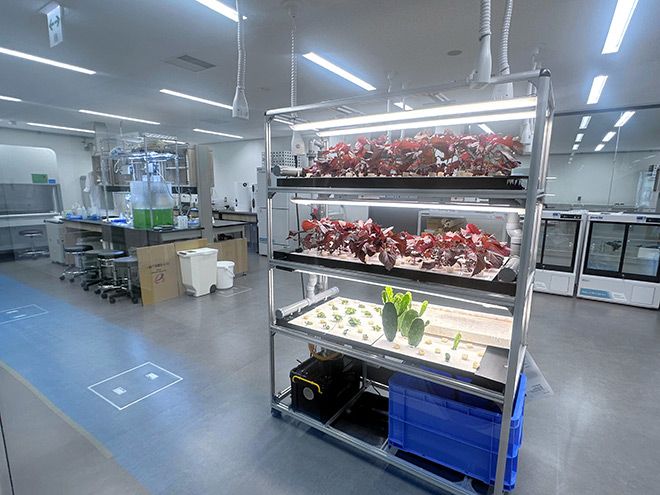More laboratories are opening in central Tokyo, dealing a blow to suburban and rural areas that have long been home to many research institutions.
Local areas have tried to attract research labs to vitalize their communities.
But companies have found that the capital offers better opportunities for research collaborations and provides convenient access amid competition for talent in science and technology.
East Japan Railway Co. (JR East) set up the Link Scholars’ Hub (LiSH) laboratory in the south building of Takanawa Gateway City when the commercial complex partially opened in front of the newest station on the JR Yamanote Line loop in Tokyo’s Minato Ward in March.
The LiSH consists of four labs where researchers can conduct basic experiments and study micro-organisms, plants and aquatic organisms. There are also private rooms.
The four labs occupy a total floor space of around 500 square meters. Each contains minus 80- and 30-degree freezers, autoclaves and other equipment.
Each lab can be rented for about 300,000 yen ($2,000) per month for a period of six months to one year.
The rental labs are well-received by companies.
Endophyte Inc., a startup that studies soil micro-organisms, is renting the Botany Lab at the LiSH.
“Compared with labs in the suburbs, it is easy to show and explain our research work to other companies,” President Toshiki Kazaoka, 33, said.
WORKER-FRIENDLINESS
Mitsui Fudosan Co. has also thrown its energy into laboratories in central Tokyo.
The leading real estate developer set up the Mitsui Link Lab Kasai in Edogawa Ward and the three-building Mitsui Link Lab Shinkiba in Koto Ward between 2020 and 2024.
The company plans to open another Mitsui Link Lab located a three-minute walk from the Mitsukoshi-mae subway station in the Nihonbashi district of Tokyo’s Chuo Ward in 2026.
Mitsui Fudosan says the rental labs offer a friendly working environment for researchers, who have become increasingly eager to work in central Tokyo rather than suburbs since the COVID-19 pandemic.
When soliciting tenants, the company emphasizes how the locations can help reduce commute times, balance careers and family life, and meet other lifestyle needs.
Mitsui Link Labs are used by a variety of companies, including those in the pharmaceutical, semiconductor and food industries.
Mitsui Fudosan intends to expand its operations further by providing several rooms with different ceiling heights and sizes in the same facility, depending on the research fields.
Daily goods producer FineToday Holdings Co. based in Tokyo’s Minato Ward set up its own research and development facility, called the FineToday Beauty Innovation Center, in the capital’s Toyosu district in 2023.
The company said it placed importance on accessibility from its main office and Saitama Prefecture, where its production base is located.
The facility has received positive reviews from about 50 researchers and other staff, who cited the ease of collecting information through interviews with other companies and seminars.
“It is advantageous also from the standpoint of recruiting employees,” a representative said.
BLOW TO LOCAL AREAS
The trend of opening laboratories in central Tokyo will likely continue.
“As competition intensifies to secure offices in central Tokyo, developers can increase the rent per ‘tsubo’ (3.3 square meters) and make more profits by turning them into laboratories,” said Gaku Funada, a principal researcher at the Japan Research Institute Ltd.
However, there are concerns local regions could be hurt by the overconcentration of laboratories in central Tokyo.
“It can be a factor that sends local industries into a decline,” Funada said. “Administrative authorities must grasp the actual conditions of labs concentrated in central Tokyo and promote a system in which labs in urban and local areas can work together.”


AloJapan.com